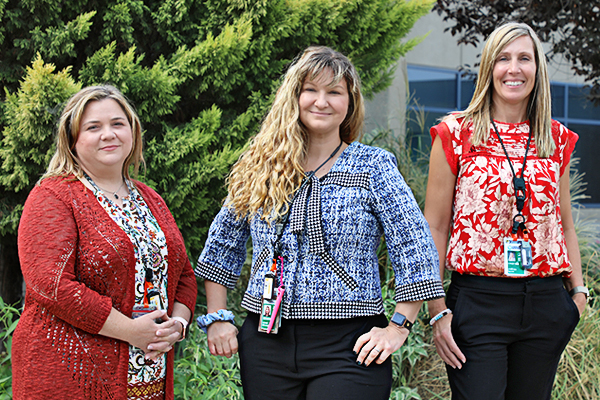Current and past participants in the Nuclear Executives of Tomorrow (NEXT) program from Energy Northwest are (from left) Rebeka Seemann, Organizational Effectiveness; Denise Brandon, Planning, Scheduling & Outage; and Cristina Reyff, vice president for Corporate Finance and chief financial officer.
If there are fewer than a dozen people in any given meeting in the nuclear industry, the odds are high only one of them is a woman.
It's a reality that most women in nuclear are used to, especially those in leadership roles.
And that's where the Nuclear Executives of Tomorrow (NEXT) program comes in. A joint venture between Women in Nuclear (WIN) and the Nuclear Energy Institute (NEI), NEXT is geared toward helping women tackle the unique challenges they face in the nuclear industry.
The yearlong, cohort-based program began three years ago and a representative from Energy Northwest has participated in each group.
“It's been so exciting. Right away, I met 11 other women – all managers or directors," said Denise Brandon, Planning, Scheduling & Outage manager, who graduated from the program during WIN's annual conference in early August. “We don't usually get to go to meetings and have more than one woman in there. But that's why they started this. It recognizes that there aren't many female executives out there."
Ongoing impact
Rebeka Seemann, Organizational Effectiveness, is part of the third NEXT cohort, which kicked off during the August conference. Cristina Reyff, vice president for Finance and chief financial officer, participated in the first year of the program.
Reyff leans on things she learned in the program almost weekly, if not daily.
“It is at the very top in terms of a development opportunity and the impact it's had on me," said Reyff, who is the senior sponsor for EN's WIN chapter.
The program includes training in leadership, sessions with an executive coach, mentoring, and the opportunity to network and learn from other women in the industry and beyond. Each cohort also completes a capstone project. Reyff's group created a website offering leadership competency research, tools and tips; Brandon's created #NukeBoss, which offers mentoring via Instagram.
“Sometimes we think we're unique in the struggles we face as women," Reyff said. “To meet 11 other women and find out that you're not alone; immediately you have 11 other people you can depend on, open up to, confide in and turn to for insight or advice. It's just amazing."
The program helps prepare women who are one to two years away from an executive role by teaching them to embrace their unique perspective, as well as value diversity in thought and approach.
“It showed me the kind of leadership quality that women bring to the table, and how valuable that is, how valuable that diversity is," Reyff said, who was promoted to vice president just as she began her program. “It taught me to have confidence in myself and the way I lead. I can show up being 'Cristina.' I don't have to take on the leadership traits of my peers."
Strength in diverse voices
Increasing the diversity of leadership at Energy Northwest, and in nuclear as a whole, is something Chief Nuclear Officer Grover Hettel feels strongly about. Hettel is part of WIN's national executive advisory council. Chief nuclear officers nominate NEXT program participants.
NEXT exposes participants to the structure of other organizations and allows them to bring new ideas about leadership back to the agency, Hettel said. It also makes them stand out as a qualified candidate for leadership positions.
“With NEXT, WIN is trying to target positions where they're not seeing as many women. They want to get someone to site manager and plant manager ranks. This helps us break down barriers," Hettel said.
Throughout his career, Hettel has mentored dozens of individuals, men and women. He's studied how to be a better mentor for his women employees, and it has helped him appreciate the challenges they face, as well as the value their perspective brings.
“People think differently," Hettel said. “You want those differences in your leadership team, but you have to cultivate it. You have to set an expectation that it is welcomed. Those differences can be about race or gender, or about the region you're from. It's all critical. If everyone thinks the same, we're all going to run off the cliff together. We need that diversity."
Make a difference
Through NEXT, participants learn not only how to be stronger leaders themselves, but how to cultivate leadership in their co-workers of all genders. Embracing diversity takes mindfulness and commitment, but there are steps individuals can take to welcome other voices to the table.
“Ask more questions. Stay as curious as you can for as long as you can," Reyff said. “It allows you to really hear someone's voice. Most people don't need advice; they need an opportunity to collaborate and articulate their view."
And lastly, don't make assumptions about a person's qualifications or capabilities, especially based on gender, she said.
“Hear what they have to say instead of judging whether they bring value based on a preconceived notion," Seemann said. “Think about who the right people are to have in the room, both from a technical perspective and a diversity of thought perspective."
